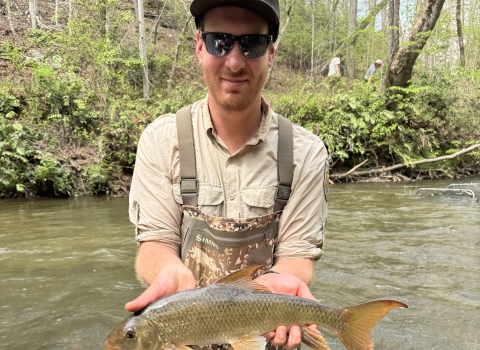What compels serial criminals to repeatedly break the law? While we can’t know for sure, the heart of it may be a sense of entitlement, a righteous belief that they are above the law. Whatever the rationale poachers use, we at the U.S. Fish and Wildlife Service are determined to stop their crimes. We work with our state, tribal and provincial partners across North America to root out people who feel that they are above the law. Take a moment to learn about two Missouri poachers who are now unwelcome to hunt in Kansas, Nebraska, Missouri and Canada - and how one is going to prison.
Sometimes poachers can be their own worst enemies, and excessive pride can be their undoing. They often can’t help but publicly brag about their illegal endeavors. In this case, it was more of an internal brag among friends. Even though David Berry, Jr. of Everton, Missouri, has been cited or criminally charged more than 70 times for wildlife crimes by the Missouri Department of Conservation, it didn’t stop him from continuing to disregard state and federal laws. This case constitutes his undoing and documents poaching across multiple states and in Canada.
Why is this a federal crime?
The short answer is that it’s a federal crime to break state wildlife laws and cross state lines with the wildlife. Read on to learn more about the Lacey Act. While Berry committed many crimes over the years, the heart of this federal case started in December 2015, when an agent with the Missouri Department of Conservation reached out to a U.S. Fish and Wildlife Service special agent with information about Berry’s interstate poaching in Kansas and a request for support from the federal government. It’s important to note that while there are legal seasons for out-of-state folks to hunt white-tailed deer in Kansas, Berry was flat out poaching and using illegal methods, like shooting from roadways. It’s also important to note that when Berry transported the illegal buck from Kansas to Missouri, he also violated the Lacey Act. While Congress has amended this law over the years, the Lacey Act is our nation’s oldest wildlife law, one that has carried heavy fines and penalties for more than a century. It was at this point that state conservation officers from across Missouri, Kansas and Nebraska started a joint investigation with the U.S. Fish and Wildlife Service and looked for a coordinated path forward to shut down this notorious poacher.
As with most criminal cases, it can take years to collect the necessary evidence to reach a conviction. During the course of this investigation, the Missouri Department of Conservation obtained search warrants for Berry’s cell phone and began to review the contents. By reviewing Berry’s cell phone, investigators learned of a second defendant, Cody Scott of Mt. Vernon, Missouri, who took an illegal trip with Berry to Canada in 2015. During the take-down in the summer of 2016 that involved an extensive search and series of interviews, Scott also admitted to the illegal trip to Canada, as well as poaching a large mule deer buck in Nebraska and transporting the antlers from Nebraska to Missouri. These items were seized from a taxidermist near Springfield, Missouri. Thanks to our Canadian counterparts who participated in the take-down, we were better able to understand the scope of the crimes committed by Berry and Scott.
Plot twist! Enter Bambi
The plot only seemed to thicken for Berry in the years following the 2016 take-down. One prosecution took place after that time, where Berry was charged in Lawrence County, Missouri, for additional state wildlife violations. Plot twist! Enter Bambi. When Berry further violated his probation agreement with Lawrence County, he was subsequently sent to jail for eight months. Seeing the depth of Berry’s serial poaching, the judge in the case ordered Berry to watch the Disney movie Bambi on multiple occasions.
In the early spring of 2021, as the clock was ticking on the statute of limitations for Berry’s and Scott’s federal crimes, agents needed to move the case through to the prosecution phase with the Department of Justice. While the physical evidence of their crimes in Canada was never found, the large amount of incriminating evidence on Berry’s personal cell phone was enough to bring things into the light of the federal justice system.
On April 15, 2021, Scott was sentenced in the Western District of Missouri for a misdemeanor violation of the Lacey Act. Scott will pay a $7,500 fine, receive three years of probation and lose hunting privileges in Missouri and Nebraska for the duration of his probation. On April 20, 2021, Berry was sentenced in the Western District of Missouri for a misdemeanor violation of the Lacey Act. Berry’s sentence included two months in federal prison and requires that he pay a $9,000 fine. Berry is also set to receive a year of probation and lose his hunting privileges across Missouri and Kansas during his probation. Fines from both poachers will be paid to the Lacey Act Reward Account.
What is the Lacey Act Reward Account and how can I report a tip about wildlife crime?
While special agents and wildlife inspectors within the Office of Law Enforcement work with our federal, state and tribal conservation partners across the country to investigate wildlife crime, we also depend on tips from concerned citizens. People from all walks of life step up and share information that helps us protect everything from native turtles and pallid sturgeon to bald eagles and white-tailed deer. We use funds from this special account to reward folks who share valuable information that leads to an arrest or conviction. We also use these funds to help offset the costs of caring for live animals that have been seized in active wildlife crime cases.
As with all good detective work, it’s important to recognize the people who make these prosecutions possible in the first place. We thank Missouri Department of Conservation Agent Andy Barnes and other assisting agents in Missouri, as well as officers from Nebraska and Kansas who assisted in securing the evidence in this case. This included the bucks that Berry illegally killed in Kansas and Scott illegally killed in Nebraska. We’d also like to thank everyone involved for their continued dedication and professionalism over the years. Together we can help keep wildlife healthy, sustainable and wild.





